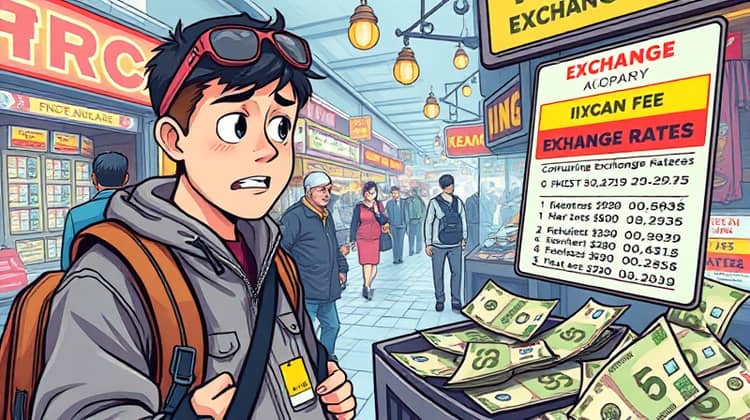Dynamic Currency Conversion Fees Explained: Avoid Surprises Abroad

Traveling abroad can be an exciting adventure, but it comes with various financial considerations. One important factor to keep in mind is how currency exchange works, especially when using your credit or debit card in a different country. Dynamic Currency Conversion (DCC) is a service offered by many merchants and ATMs that allows you to make purchases in your home currency instead of the local currency, but it comes with fees that can catch travelers off guard.
In this article, we will delve into the ins and outs of Dynamic Currency Conversion, examining its mechanisms, costs, benefits, and drawbacks. By the end, you'll be equipped with the knowledge to navigate your financial transactions abroad without incurring unnecessary fees.
What is Dynamic Currency Conversion (DCC)?

Dynamic Currency Conversion (DCC) is a financial service offered by many international merchants and ATMs that enables travelers to make purchases in their home currency instead of the local currency. This service aims to provide convenience and transparency by allowing customers to see exactly how much they will be charged in their own currency at the point of sale.
However, while DCC may seem helpful, it often comes with higher exchange rates and fees than local currency transactions, resulting in potentially large additional costs for unsuspecting travelers. To better understand the implications of using DCC, let's take a closer look at how it functions.
- DCC allows cardholders to view and approve the conversion rate at the time of transaction.
- The merchant displays the amount in the home currency before finalizing the sale.
- The actual currency conversion takes place at the time of the transaction, enabling immediate pricing with the home currency.
Being informed about how DCC works can save you from unpleasant surprises when reviewing your bank statements post-trip.
How DCC Works

When a traveler uses a credit or debit card at a foreign merchant that offers DCC, they are typically presented with the option to pay in their home currency. The amount displayed in the home currency reflects the current exchange rate at that moment, along with any associated fees.
The process is simple: once you decide to make a purchase, the merchant will convert the transaction amount into your home currency using their exchange rate, which is often higher than the market rate. After accepting the DCC option, you'll receive a receipt showing the amount in both the local currency and your home currency, alongside any conversion fees deducted.
It’s important to pay close attention to the conversion rates being offered, as they may not be as favorable as anticipated. DCC transactions may seem more convenient, but they can often lead to unexpected costs.
DCC Fees and Costs

While DCC provides a seemingly straightforward transaction method, it’s essential to understand that it may incur additional fees. The exchange rate offered by most merchants tends to include a markup above the interbank or market rate, which can significantly increase your overall cost.
Furthermore, DCC fees may vary from one merchant to another, with some charging high percentages on top of the exchange rate for the conversion service. Travelers might also incur additional foreign transaction fees from their card issuer if DCC is not selected, which compounds the total costs.
In summary, while DCC can simplify foreign transactions, it is vital to scrutinize the fees associated with it, as these can lead to much higher costs than initially anticipated.
Benefits of DCC

Using DCC does have some advantages that appeal to many travelers. One of the most notable benefits is the clarity it provides regarding how much will be charged in your local currency, eliminating the need to mentally calculate costs during purchases abroad.
Another benefit is that DCC transactions allow for ease of budgeting as travelers can plan their expenses without having to deal with fluctuating exchange rates after the fact. With a fixed amount shown upfront, travelers may find it easier to assess their spending in real-time.
- Convenience of seeing the transaction amount in your home currency.
- Protection against fluctuating exchange rates during your trip.
- Ability to budget effectively with known costs upfront.
Despite these advantages, it’s crucial to compare the costs of using DCC versus paying in the local currency to make an informed choice on how to proceed.
Drawbacks of DCC

Despite its apparent convenience, there are significant drawbacks to using DCC that travelers should consider. Oftentimes, the exchange rates provided through DCC are less favorable than those offered by the bank or the local currency rate, resulting in higher overall costs.
Additionally, not all merchants who offer DCC will provide transparent information regarding the exchange rates or fees upfront, which can lead to confusion and unexpected charges later. Travelers may find themselves surprised when checking their statements after returning home, as increased expenditures can accumulate faster than expected.
- Higher exchange rates compared to local currency transactions.
- Lack of transparency regarding fees and conversion rates.
- Potential for becoming more challenging to track spending accurately.
Being aware of these potential issues is critical for making informed choices when it comes to currency transactions during your travels.
How to Avoid DCC Fees

Avoiding DCC fees is easier than you might think, and it first starts with understanding your options. Before finalizing any transaction, simply look for the option to pay in local currency instead of your home currency, as this choice usually offers better rates and fewer fees.
- Always choose to pay in local currency where possible.
- Ask merchants about their fee structure before confirming the transaction.
- Monitor your bank statement after traveling to catch any unexpected charges.
By taking these steps, you can save money and avoid unpleasant surprises related to currency conversion fees. Be proactive in managing your financial decisions while overseas to ensure a more enjoyable travel experience.
Tips for Safe Currency Transactions

To ensure you handle currency transactions safely while traveling abroad, consider implementing some best practices. Whether you're paying with cash or card, a bit of preparation can go a long way in safeguarding your funds.
- Keep track of exchange rates before you travel to know what to expect.
- Limit your cash transactions and use cards with no foreign transaction fees.
- Keep your bank contact details handy in case of lost cards or fraudulent activity.
By following these tips, you can enhance your financial awareness and make wiser decisions concerning currency transactions abroad.
Conclusion

In conclusion, Dynamic Currency Conversion can provide convenience for travelers, but it is not without its pitfalls. Understanding how DCC operates, its associated fees, and the benefits and drawbacks can significantly impact your travel budget.
Ultimately, being an informed traveler will help you navigate financial decisions more effectively while abroad. By paying in local currency and avoiding unnecessary fees, you can enjoy your travels without the burden of unexpected financial surprises.






